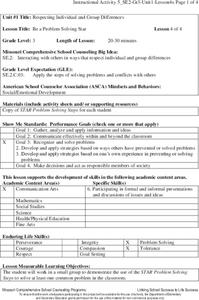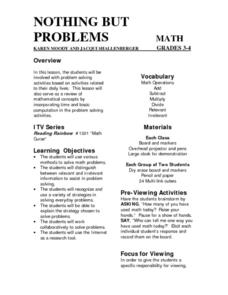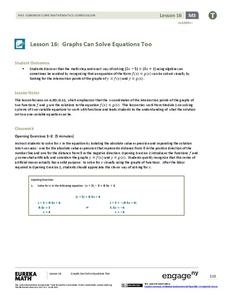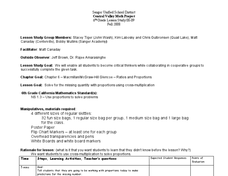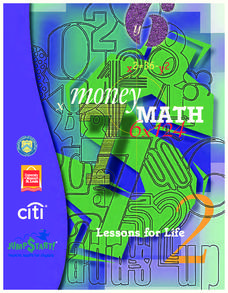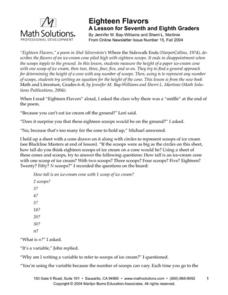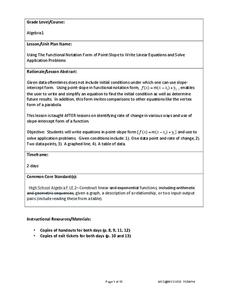Missouri Department of Elementary
Be a Problem Solving Star
Reach for the STARs! Using the resource, scholars review the STAR (Stop, Think, Act, Review) method and discuss how to use it to solve a math equation. Next, small groups collaborate to solve a common problem in the classroom using the...
Missouri Department of Elementary
Be a Problem Solving Star
Encourage scholars to problem solve everyday frustrations using the STAR method. Using the acronym, learners remember to stop, think, act, and review. Participants begin with a math analogy in which they problem-solve to find the correct...
For the Teachers
$1 Math
Captivate your class by having them find the value of their names, different zoo animals, musical instruments, etc.,with a mental math lesson. Using the coding formula listed, children learn to fluently estimate and calculate...
EngageNY
Problem Solving When the Percent Changes
Use more than one whole to solve percent problems. The ninth installment in a 20-part series has pupils work percent problems in which they must determine two wholes. Individuals use double number lines to represent and solve the...
EngageNY
Solving Problems in Two Ways—Rates and Algebra
Build confidence by using multiple approaches to problem solving! This resource uses a visual and algebraic approach to solving application problems. A discussion is included about efficient approaches to different problems.
EngageNY
Solving Problems by Finding Equivalent Ratios
Combine total quantities and equivalent ratios in problem solving. The fifth lesson in a series of 29 presents problems that can be solved using equivalent ratios. Pupils use part-to-part ratios and either sums or differences of the...
EngageNY
Problem Solving Using Rates, Unit Rates, and Conversions
Find a way to work with rates. The 23rd part in a 29-part series presents work problems for the class to solve given work rates. Pupils compare rates to determine which is faster. Some problems require learners to convert the rates to...
Curriculum Corner
Menu Math
Getting a meal, side dish, drink, and dessert can be delicious—but it can be expensive too! Practice addition and subtraction with money in a lesson that focuses on a sample menu, complete with task cards and word problems.
Curated OER
Nothing But Problems
Here is a fabulous lesson on problem solving in the mathematical world. In it, third and fourth graders get lots of great coaching on how to approach word problems, and how to best find a solution. They watch an episode of Reading...
Alabama Learning Exchange
Can You Solve the Mystery of the Variable?
Solving a murder is like isolating a variable. Using a video on a murder mystery, the narrator introduces the idea of solving a literal equation for one variable. After solving several equations, the class comes up with a set of...
EngageNY
Graphs Can Solve Equations Too
There are many equations Algebra I students are not ready to solve. Graphing to solve gives them a strategy to use when they are unsure of an algebraic approach to solve the problem. The lesson exposes learners to a wide variety of...
Curated OER
Using Proportions to Solve Problems
Skittles and math? Pupils will work as a class to determine how many orange Skittles are in a large bag by using proportions. They will problem solve, estimate, and share their thinking. Then, they will each receive a small bag of...
University of Missouri
Money Math
Young mathematicians put their skills to the test in the real world during this four-lesson consumer math unit. Whether they are learning how compound interest can make them millionaires, calculating the cost of remodeling...
EngageNY
Tax, Commissions, Fees, and Other Real-World Percent Problems
Pupils work several real-world problems that use percents in the 11th portion of a 20-part series. The problems contain percents involved with taxes, commissions, discounts, tips, fees, and interest. Scholars use the equations formed for...
Virginia Department of Education
Practical Problems Involving Decimals
After discussing decimals and "going shopping" in the classroom, young mathematicians are given four practical word problems that require them to estimate their answers, given specific information. The highlight of the lesson is...
National Security Agency
Are You Game? A Lesson Connecting Fractions and Probability
Exactly how fair are the board games children grow up playing? Young mathematicians investigate this questions as they work their way through this five-lesson series on basic probability.
North Carolina State University
Exploring Genetics Across the Middle School Science and Math Curricula
Where is a geneticist's favorite place to swim? A gene pool. Young geneticists complete hands-on activities, experiments, and real-world problem solving throughout the unit. With extra focus on dominant and recessive genes, Punnett...
Intel
Forensics: Get a Clue
Although the methods are all scientific, forensic science was started by police officers rather than scientists, who relied on observation and common sense. Young detectives use many tools to solve crimes around the school in a...
University of Missouri
Money Math
Wouldn't your class members love to become millionaires? It doesn't happen overnight. Teach young entrepreneurs about personal finance and money management with a series of lessons focused on money math. Pupils learn about...
EngageNY
Markup and Markdown Problems
There is a 100 percent chance this resource will help pupils connect percents to financial literacy. Young mathematicians use their knowledge of percents to find markups and markdowns in financial situations in the seventh segment in a...
Marilyn Burns Education Associates
Eighteen Flavors
Your learners will be tantalized by this inquiry-based, collaborative activity as they discover how to write an equation that represents the height of an ice cream cone. Given the scenario based on the poem, "Eighteen Flavors," and...
EngageNY
Population Problems
Find the percent of the population that meets the criteria. The 17th segment of a 20-part unit presents problems that involve percents of a population. Pupils use tape diagrams to create equations to find the percents of subgroups...
West Contra Costa Unified School District
Point-Slope Application Problems
Create a linear equation for a problem when the intercept information is not given. The two-day lesson introduces the class to the point-slope form, which can be used for problems when the initial conditions are not provided. Pupils...
EngageNY
Word Problems
Use several skills to solve word problems leading to systems of equations. Scholars define variables and write equations to model situations described within word problems. Pupils solve the resulting system of linear equations using...


